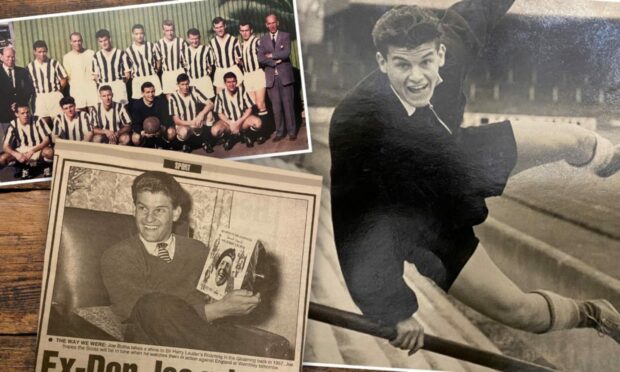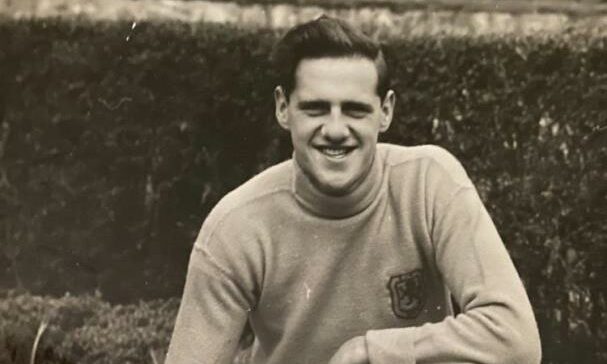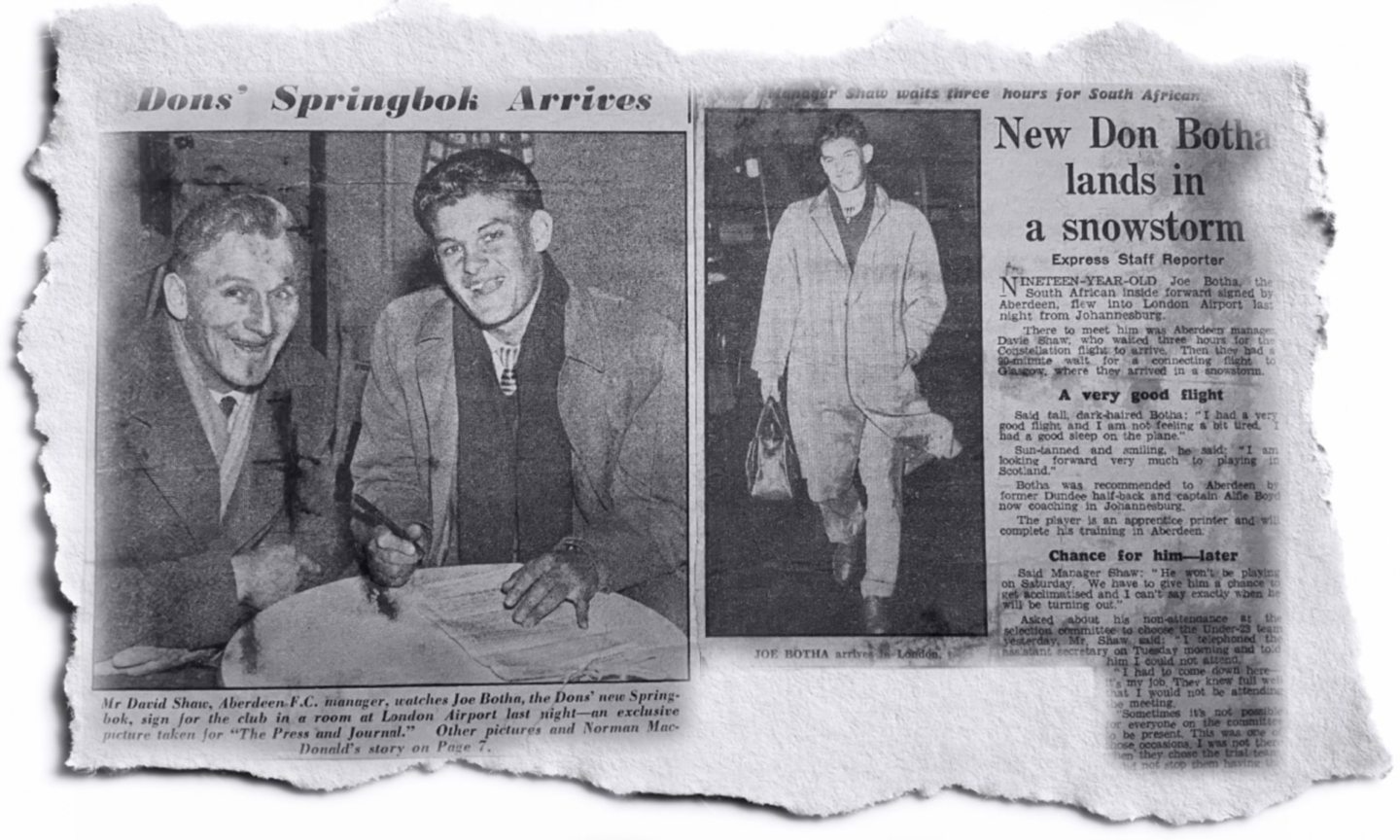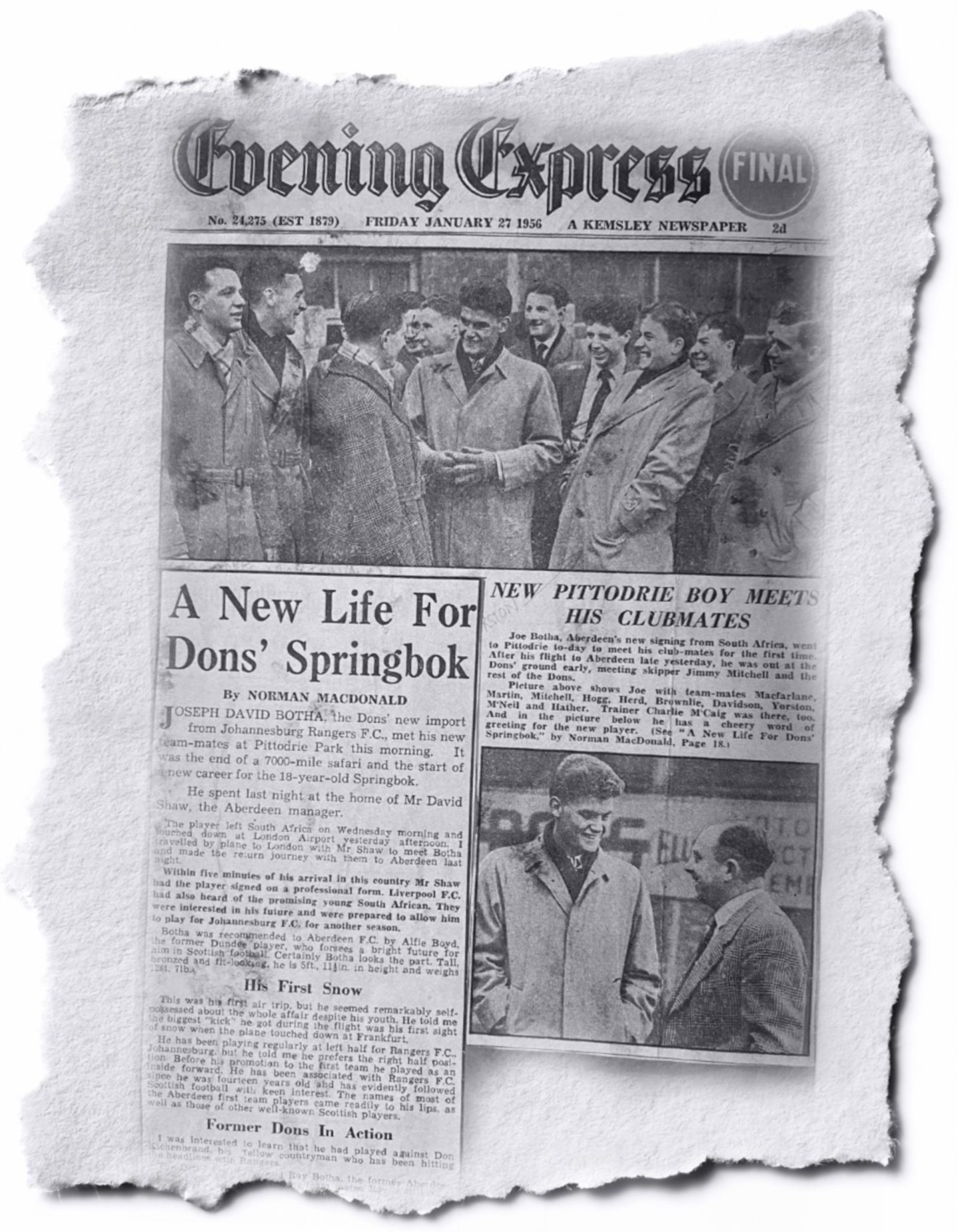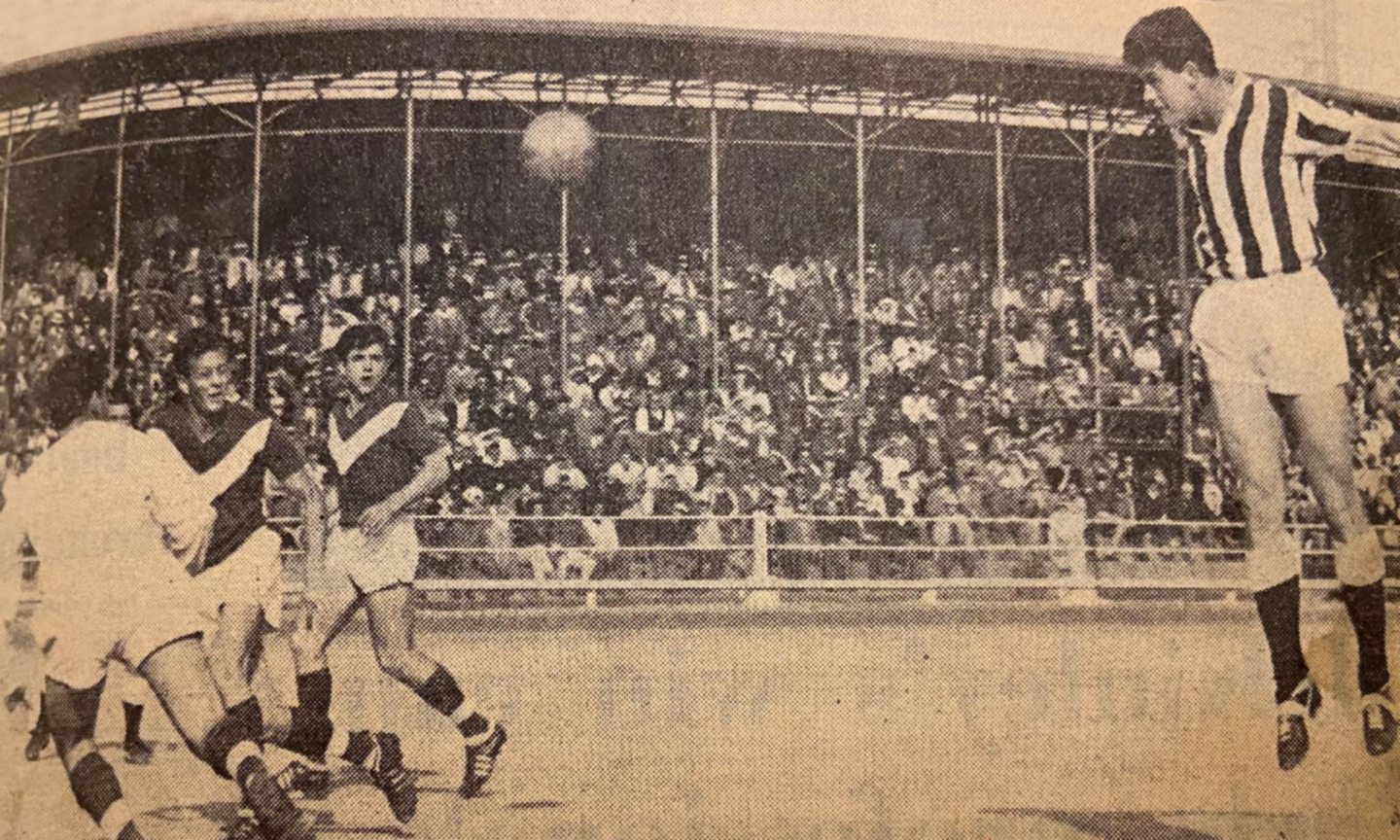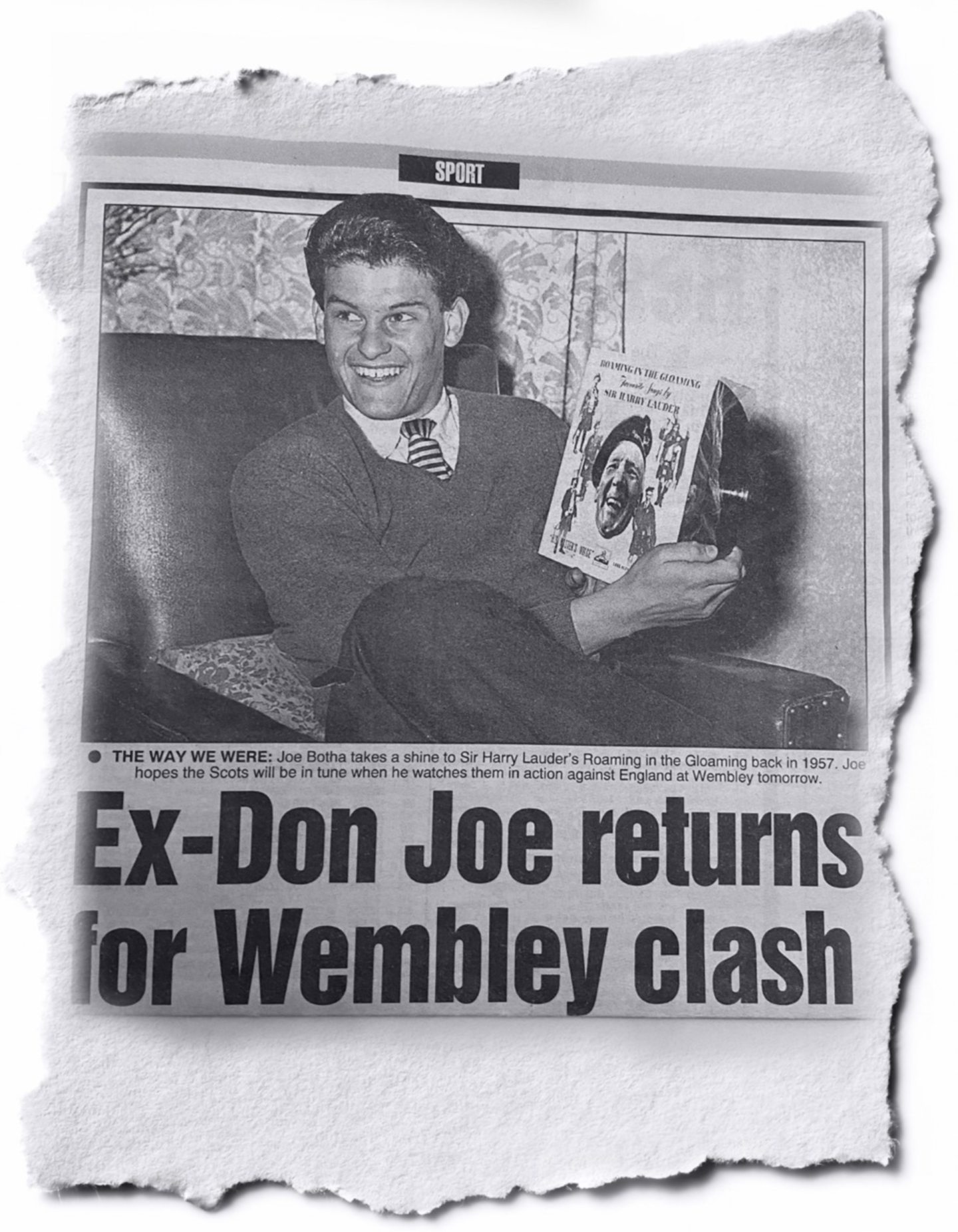Joe Botha and his family sat down last weekend and watched a film together to help commemorate Mother’s Day in South Africa.
Nothing unusual in that, you may think, but this was a little home movie which transported Botha back to the time when he first landed in Aberdeen and played for the Pittodrie club all of 66 years ago.
At that stage, the teenager had never seen snow before, but he was well acquainted with the white stuff soon enough after arriving with the Dons manager David Shaw at Dyce Airport, via Frankfurt, in January 1956.
It was also the maiden time he had travelled on an aeroplane, but his 7000-mile journey was the start of a brief, but cherished, stay in the Granite City.
And now, although he’s 84 years old, he and his son Vaughan have spoken of their delight at being able to take a “wonderful” stroll down memory lane – following the discovery of the cine films by an Aberdeen woman last summer.
The cache of material was shot by Jim Lornie, a Granite City stalwart who played professional football for St Mirren.
He recorded all manner of family trips to Aberdeen Beach, Duthie Park, Pittodrie stadium and major sporting occasions.
These include his brother, Jack, playing for Banks O’Dee on the famous day they won the Scottish Junior Cup in front of more than 30,000 fans at Hampden Park in 1957, and captivating pictures of the arrival of the mercurial South African forward Botha at Pittodrie the previous year.
A young Dons supporter, Laura Taylor, contacted The Press & Journal to show us the poignant and evocative contents of some of the films and explained why they were so significant to her and her family.
In particular, she spoke about her delight at being able to watch her great uncle and his brother, neither of whom she ever met, in addition to several members of her own kith and kin through the medium of celluloid.
The trail originally went cold
She told us: “As an AFC fan, I was particularly interested in all the footage of Joe Botha – a South African player who joined Aberdeen in 1956.
“We are still not sure how he came to be in the family videos, but we would love to be able to send it to any of his family, if they are out there somewhere.”
Months passed, 2021 turned into 2022 and it seemed that the trail might have gone cold. Then, suddenly, in mid-April, we were contacted by the Botha family, who talked about their memories of the north-east.
And Joe has gained the opportunity to retrace his steps to the season when he swapped the Cape for Caledonia and became a cult figure at Pittodrie.
The tall, strapping Springbok, with a rugby player’s build, was certainly excited at moving from his homeland and the Dons snaffled him, even though Liverpool were also interested in securing his services.
It was such a major deal at the time that The P&J sports editor Norman MacDonald was involved in helping bring Botha back to Aberdeen.
He said in the edition of January 27 1956: “Joseph David Botha, the Dons’ new import from Johannesburg Rangers FC, met his new teammates at Pittodrie Park this morning. The player left South Africa on Wednesday morning and touched down at London Airport yesterday afternoon.
“I travelled by plane to London with Mr Shaw and made the return journey with them to Aberdeen last night. Within five minutes of his arrival in Scotland, he had been signed on a professional contract.
“Botha, the eldest of a family of eight and an apprentice bookbinder, was recommended to the Dons by Alfie Boyd, the former Dundee player, who foresees a bright future for him in Scottish football. I was interested to learn that he had played against Don Kitchenbrand, his fellow countryman, who has been hitting the headlines with Glasgow Rangers.”
The Aberdeen youngster was quick to demonstrate his mettle, even though he played for the reserves during his spell in Scotland. Indeed, he scored with his very first kick of the ball on his debut for the Dons against Motherwell A.
Vaughan told me of how his dad had enjoyed the camaraderie at Pittodrie and had been struck by the beauty of the granite buildings around the city.
‘He loved the city and its people’
He added: “My father was made to feel welcome from the moment he landed in Aberdeen and he loved the atmosphere around the club and the huge amount of interest which there was in football among so many people.”
However, as a teenager in a far-off land who found it hard to acclimatise to the chilly wind of the North Sea, Botha struggled with homesickness, missed his parents and left the club in May 1957.
But, even if it had been a brief stay, it has stuck with him forever.
Vaughan added: “After returning to South Africa, dad resumed playing for Rangers FC in Johannesburg and then moved into coaching at Balfour Park. He has always been passionate about football and that hasn’t changed.
“Even now, he still keeps in touch with Vernon Wentzel who played in Scotland (for Kilmarnock) as a striker in that period.
“When we met up and watched the film, it took him back to those days. And you could see from the sparkle in his eyes that he had never forgotten them.”
Laura, for her part, is thrilled that the films, created by her relative all those years ago, have reached an audience thousands of miles away.
She said: “In one of the clips, you see a young well-dressed man walking into Pittodrie, training in the stadium and holding the league title flag in 1955.
“After asking around and contacting the club, we were able to confirm that the man in the video was indeed Joe Botha.
Great how situation worked out
“Ever since the videos were uncovered, we have been wondering what became of Joe and how my Great Uncle Jimmy had come to know him.
“To hear that his son had got in touch after reading our article and discover that Joe was still alive was just the best news and we are so happy that we were able to pass on the footage for the family to watch it together!
“It makes for a nice positive story, doesn’t it!”
